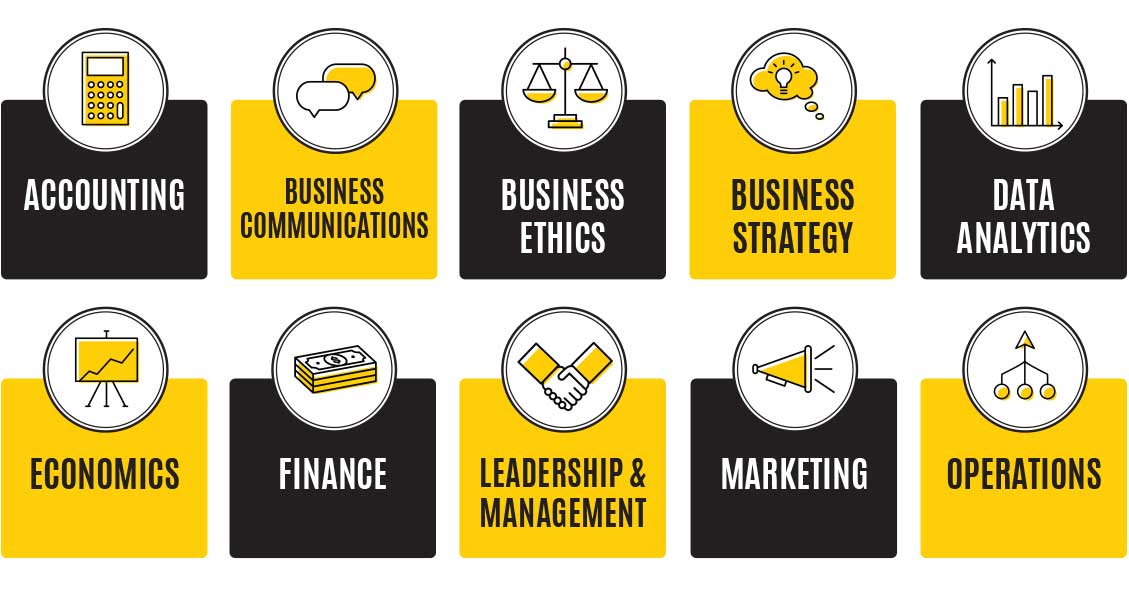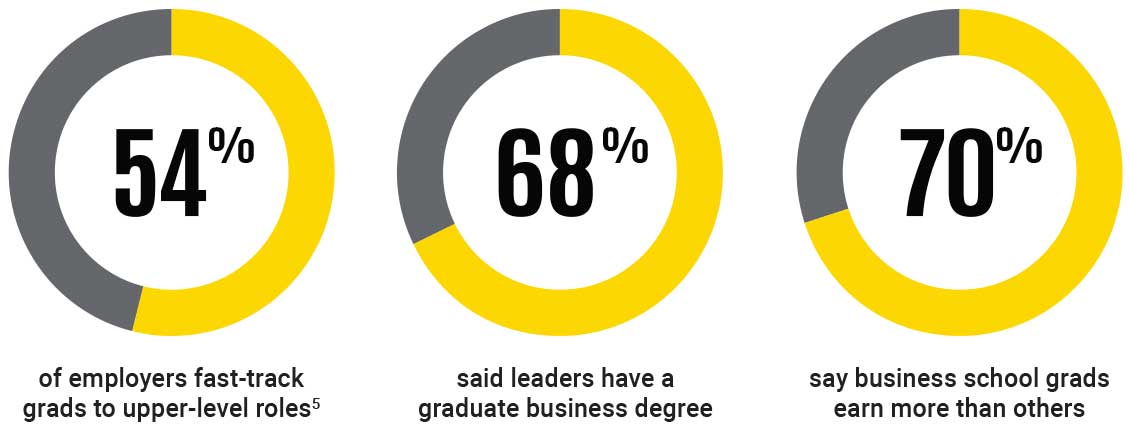
An MBA. It’s just a degree, a piece of paper, time spent in the classroom, right?
Hardly.
For companies seeking new hires, an MBA means an employee who’s ready to hit the ground running. Candidates with MBAs take less time to train, bring more expertise to the table, and ultimately, drive higher profits. Why is an MBA valuable to a company, and how does an MBA give you a leg up on the competition in your job market? Let’s dive into some reasons.
Do employers value an MBA?
Yes. And employers who don’t, should.
According to QS TopMBA,1 there are at least 10 reasons why a company should appreciate the holder of an MBA, including:
- Better communication and team-building skills
- Easier mastery of new skills and techniques
- Faster to train, providing a quicker return on investment
- Bringing new information from school to the workplace
- Having a holistic “bigger picture” view of management and business
If you hear your boss asking "what is an mba useful for" this short list should help you answer that question.
What does an MBA teach you?
In short, the degree returns the skills recruiters are looking for and the skills an employee needs to succeed in business. But what specific skills does an MBA give you?
According to MBA.com,2 the core curriculum of MBA courses typically includes the topics in this diagram:

Combined, these elements take on the appearance of a corporation’s departments. During an MBA education, you’ll gain the skills needed to help lead a company, be it your own or someone else’s. You’ll gain the well-rounded expertise necessary to make their mark.
Additionally, there are elective courses and opportunities that help students work on leadership abilities and “crucial soft skills in a collaborative environment that fosters discussion among your classmates, advisors and instructors,” according to MBA.com.
So what is an MBA useful for? Take a second look at the list of bullet points above. Students who ‘master’ each are well on their way down the road of professional success.
Additional benefits of an MBA degree to a company include strategic thinking, skills adapted to the digital world, entrepreneurial spirit, problem solving, and networking. All marks of a leader.
According to the Graduate Management Admission Council (GMAC) Corporate Recruiters survey,3 more than a quarter of companies globally plan to hire MBA graduates. They’re looking for skills purposefully developed during MBA studies.
But does MBA school really matter?
Absolutely–if you take full advantage of the educational opportunity. An article from the California Business Journal4 outlines eight additional benefits that don’t just make students better at business, but have the ability to make them better, more well-rounded people:
- A broader worldview
- Higher pay
- Boosted confidence
- Improved network
- Nurtured self-discipline
- Enhanced knowledge
- Added credibility
- Improved communication skills
One key benefit to highlight is “higher pay.” The journal noted that some businesses reward newly hired MBA-holding employees with signing bonuses as high as $30,000, which is especially beneficial for recent grads who have to start paying down debt.
Location, location, location. Do employers care where you get your degree?
They do. Leading employers recruit from top MBA programs. Attending a top-tier school can give graduates advantages in terms of reputation, networking opportunities, and access to resources.
That said, maybe a top program isn’t a goal for everyone. A local school that isn’t ranked with the best can still provide valuable learning. It’s important to keep in mind that different schools have different strengths and focuses. For example, the Iowa MBA is ranked #22 for part-time programs and costs a fraction of most top-ranked schools.
Finding your perfect fit is often a combination of the right location, the right price, and the right reputation.
Back to the people who hire…do employers really care about an MBA?
They must. According to another survey5 conducted by GMAC, 54% of employers said business school graduates tend to have a fast-track to upper-level positions, and 68% said leaders in the organizations typically have a graduate business degree. Recruiters are looking for graduates who can have an immediate impact and who are looking to directly influence business success.
But what does an MBA do for you? In addition to being more hirable, 70% of employers say that, within their organizations, people with a graduate business school education tend to earn more than others.
Also according to an MBA.com survey,6 over the lifetime of MBA graduates, these grads can expect to earn $3 million more than someone with just a bachelor’s degree. Yes, $3 million!

How do businesses justify that expense? How does an MBA benefit a company to the tune of millions of dollars more in salary payouts?
It’s worth noting that companies don’t have to hire someone with an MBA. Hiring managers have options.
First, they can hire someone green, with no experience and no knowledge. An employee who needs to be trained, taught the ropes, and brought up to speed. Of course, that takes time. And with the speed of business today, time is most definitely money, and money can’t be wasted.
A second option, of course, is to hire a candidate with an MBA. Why do companies hire mbas? Because they need someone who already has skills and knows techniques. A person not just versed, but well-versed in accounting, business ethics and strategy, data analytics, economics, finance, and more. A person who can think strategically from day one. A person who understands critical analysis. A person who has interpersonal skills, who doesn’t need to be trained in basic or even advanced skills. Most of all, a person who is ready to make a move and have an impact.
Is an MBA worth it financially?
Let’s talk about your dollars and cents (or maybe sense).
The decision is not easy. There are many options to weigh. Where you are in your career. How old you are. Does the long-term benefit outweigh the short- (or long-) term cost?
Again, according to GMAC,7 employers planned to offer a median base salary of $120,000 for new MBA hires in 2024.
According to the Bureau of Labor Statistics,8 the outlook for management positions is expected to grow by about 11% by 2030. An MBA could put you on the fast track to a promotion, to becoming a leader in your profession.
These are positives that are hard to ignore.
Some employers provide compensation or additional support to those who want to pursue an MBA while continuing to work full-time. We've put together a handy guide to help you start a conversation with your boss when you're ready.
Why are MBAs so valued?
Better yet, are they valued?
The proof can often be found in the paycheck. According to the National Association of Colleges and Employers,9 the average salary for MBA graduates in 2024 is over $20,000 a year more than those with an undergraduate business degree.
Why? Because employers expect graduates with an MBA to have the academic, interpersonal, and leadership skills needed to solve their business’s problems and challenges.
What's the best MBA for small business owners and entrepreneurs?
If you’re a business owner looking for a leg up on your competition, or maybe you're an entrepreneur who simply wants to be better at what you do, is an MBA good for business?
Yes, yes, and yes, according to an article in U.S. News and World Report.10 There are three great reasons why future and present entrepreneurs might want to pursue an MBA:
- MBA programs are the best incubator for budding entrepreneurs—a safe place to test out the most creative, outrageous, and ambitious ideas without the pressure and fear of failure if those ideas don't work.
- MBA programs offer the best environment to build a team—entrepreneurial success requires teamwork, strong business relationships, and a network of classmates who can provide introductions or advice.
- They will teach students how to run and grow a company—not just launch it.
Make no mistake, owning and running a business is hard. In the long run, however, an MBA might help it be a little less hard.

What about the benefits of an MBA in Finance?
According to Forbes Advisor, an MBA in Finance “can lead to varied career opportunities and professional advancement in the financial sector” and can offer a varied list of career options, including Finance Manager, Financial Analyst, Personal Finance Advisor, and Budget Analyst.11
If you’re looking to make an impact in the world of finance, an MBA may be your ticket into that world.
How about the pros and cons of an MBA in marketing?
Adding a concentration in any discipline shows future and current employers where you want your career to go.
An MBA in marketing could help propel you more quickly into roles such as marketing director, creative director, product manager, or marketing analyst. Careers in marketing also tend to have a more favorable work-life balance than some business sectors, such as finance, where long hours often lead to higher salaries. Plus, with the rise in advertising platforms like social media, online search, and digital advertising—you’ll never get bored in an ever-evolving world where advertising touchpoints and ways to measure consumer engagement seem endless.
One con of an MBA in marketing could certainly be that trends tend to rise and fall quickly. Keeping pace with what’s new and next can become overwhelming. The best marketers know how to prioritize their efforts based on a balance of consumer behavior, business need, and sales goals—and not get distracted by the next shiny new toy.
Do I need to enroll now?
Maybe you don’t think you need an MBA today, like right now.
But what about MBA benefits in the future? What about next year and the one (or ten) after that?
If you hope to get promoted down the road, or if you want to make a faster climb up the ladder, getting your MBA may not only be beneficial today, but could pay huge dividends in the future.
Can you afford to wait?
In the end, is an MBA worth it?
That depends. According to an article in the Harvard Business Review,12 if you’re looking to “future-ready” your career, to explore new industries or functions, to accelerate your career path, and to expand and diversify your network, then yes, an MBA may be worth your time and money.
If on the other hand you’re looking for a “magic pill, someone is willing to pay for it, or you’re simply bored,” you may want to examine your motivation and re-evaluate your options.
Also worth noting, in a working paper from the National Bureau of Economic Research,13 the value of an MBA is greater if the student majored in business as an undergraduate. Did you?
MBA advantages and disadvantages.
We have laid out the upsides of getting your MBA–the positives it provides to you AND your employer. But with the ups come the downs.
On the negative side, the cost of an MBA can soar into six figures and some positions don’t require an MBA for future growth and promotion.
Business school isn’t for everyone. Before you take out student loans, consider the pros and cons of an MBA in Marketing according to masterclass.com:14
- Opportunity cost: The most obvious reason not to get an MBA is that it can be very expensive. In addition to tuition, housing, supplies, and health insurance, committing to a full-time MBA program will probably mean you’re not making any money while you’re in school. You might decide that time and money would be better spent gaining hands-on experience or building your professional network on your own.
- Different goals: Real-world experience can sometimes be more valuable, especially for entrepreneurs, than learning the ins and outs of management. Make sure your MBA program actually fits your career goals.
In the end, businesses are looking to hire and advance employees with an MBA.
They are actively searching for people with the classroom experience who are ready to put into practice what they’ve learned—business hot shots who are going to make an impact in the corporate world.
Is that you? Are you ready to roll up your sleeves and walk into the classroom?
Does an MBA change your life? Here's more data....
Here are some statistics on the job market for MBA candidates–specifically, about jobs after an MBA in the USA and what kind of salary you might expect from your present or future employer.
According to an article from Coursera15 and information from GMAC, salaries earned by MBA degree-holders are generally much higher than salaries of people in comparable roles who don’t have an MBA:
- The median starting salary for MBA graduates at US companies in 2024 is projected to be $120k.
- That’s $30,000 higher than projections for direct-from-industry hires, and $50,000 higher than job candidates with a bachelor’s degree.
- According to research from the Forte Foundation,16 the average MBA salary after five years is between $151k and $172k (these numbers represent averages for women and men, respectively).
Which way are you leaning? Are you ready to take the next step in your education and in your career?
Have you done a cost/benefit analysis to see if your expenses for an MBA will be offset by future employment and advances in your profession? You may still be asking “Why should I get an MBA?" Ultimately, it's up to you to see if you can strike a balance between the payoff and benefits to decide if an MBA is right for you.
$ 120,000
according to the Graduate Management Council
Interested in learning more about Iowa’s top-ranked, part-time MBA?
Related articles
Still have questions?
Q: How can companies effectively leverage their employees' MBA degrees?
A: Companies can utilize their employees' MBA degrees by:
- Encouraging leadership roles that utilize advanced skills.
- Implementing mentorship programs to share knowledge.
- Promoting innovative projects that require strategic thinking.
- Offering opportunities for employees to lead cross-functional teams.
Q: What are the most common skills gained from an MBA program?
A: An MBA program typically equips graduates with:
- Strategic thinking and problem-solving abilities.
- Leadership and team management skills.
- Financial analysis and budgeting knowledge.
- Marketing strategies and consumer behavior insights.
Q: How does hiring MBA graduates impact company culture?
A: Hiring MBA graduates can enhance company culture by:
- Introducing a mindset focused on innovation and growth.
- Encouraging collaboration and knowledge sharing.
- Fostering a results-oriented approach to business challenges.
- Increasing engagement through a broad range of perspectives.
Q: What industries benefit the most from MBA graduates?
A: Several industries see significant benefits from MBA graduates, including:
- Finance and Banking
- Consulting Services
- Healthcare Management
- Technology and IT
- Marketing and Advertising
Q: How can an MBA degree enhance a company's competitive advantage?
A: An MBA degree can enhance competitive advantage by:
- Equipping leaders with advanced strategic planning skills.
- Providing insights into market trends and consumer behavior.
- Enhancing decision-making processes with data-driven analysis.
- Encouraging innovation in products and services.
Q: What are the long-term benefits for companies investing in MBA training for employees?
A: Investing in MBA training for employees leads to:
- Improved employee retention and loyalty.
- Stronger leadership pipelines for future growth.
- Enhanced organizational performance and productivity.
- Increased adaptability to changing market conditions.
Q: How do companies measure the ROI of employees with MBA degrees?
A: Companies can measure ROI through:
- Evaluating improvements in productivity and efficiency.
- Assessing revenue growth correlated with MBA-led initiatives.
- Tracking employee retention rates post-MBA training.
- Gathering feedback on leadership effectiveness.
Q: What should companies consider when creating a support system for MBA employees?
A: When creating a support system for MBA employees, companies should consider:
- Offering flexible work schedules to balance studies.
- Providing financial assistance for tuition and materials.
- Establishing networking opportunities within the organization.

Check out our Employer’s Guide to the Iowa MBA for more information and insights.
Sources
- “Doing an MBA. Top 10 Incentives For Your Employer.” Quacquarelli Symonds Limited - TopMBA, March 2021.
- Bethany Garner. “What Do You Learn In An MBA Program.” MBA.com, April 2022.
- “Corporate Recruiters Survey – 2024 Summary Report.” Graduate Management Admissions Council, June 2024.
- Bobbi Marin. “8 Career Benefits of an MBA." California Business Journal. March 2025
- Dr. Rahul Choudaha, et al. “Demand of Graduate Management Talent: 2021 Hiring Projections and Salary Trends (PDF).” Graduate Management Admissions Council, June 2021.
- Matt Hazenbush. “Is Business School Worth It.” MBA.com, 2022.
Andrew Walker, et al. “Corporate Recruiter’s Survey 2024 Report.” Graduate Management Admissions Council, 2024.
- Occupational Outlook Handbook. Bureau of Labor Statistics, U.S. Department of Labor, August 2024.
- “NACE Salary Survey.” National Association of Colleges and Employers, Summer 2024.
- Stacy Blackman. “3 Reasons Future Entrepreneurs Need an MBA, and 1 Exception.” U.S. News and World Report, Aug 2016.
- Mariah St John. “Should You Get An MBA In Finance? Here’s What To Know Before You Enroll.” Forbes Advisor, February 2023.
- Liza Kirkpatrick. “Is an MBA Degree Really Worth It?” Harvard Business Review, December 2020.
- Joseph G. Altonji and Ling Zhong. “The Labor Market Returns to Advanced Degrees(PDF).” National Bureau of Economic Research, April 2020.
- “What is an MBA? The Pros and Cons of Business School.” Masterclass.com, August 2021.
- “MBA Degree Salary: 2025 Guide.” Coursera, January 2025.
- Dr. Michelle Wieser. “Experiences and Outcomes of the MBA by Gender and Race.” Forte Foundation Study, September 2021.

